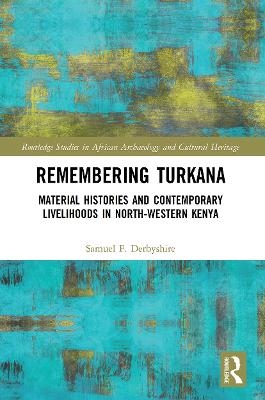
Remembering Turkana
Routledge (Verlag)
978-0-367-52330-5 (ISBN)
This book explores aspects of the socio-economic and political history of the Turkana of northern Kenya, examining the making and remaking of the regional economy via the trajectories of socio-material interaction that have structured key practices, relationships and livelihoods over the past century.
Traversing Turkana’s constituent livelihoods and examining the historical relationships between them in relation to shifting economic, ecological and political factors, the book asks what perspective emerges from an in-depth understanding of the everyday things that have taken part in processes of substantial socio-cultural transformation. By setting out a series of new examples established through long-term research in the region, it offers a characterisation of Turkana’s iterative transformation as the articulation of a set of long-term continuities. Investigating quotidian personal and community histories, it argues that Turkana’s complex network of livelihood interactions has, on the whole, strengthened over time through its continual reformulation, as identities, livelihood practices and social institutions have been re-imagined and reshaped with each new generation in order to reconstruct accumulated memory and knowledges.
Remembering Turkana provides a wide-ranging socio-historical overview of the Turkana region and people, situating critical contemporary issues within diverse bodies of literature. The characterisation of long-term change and continuity, as articulated and enacted via material culture production, use and exchange, that it offers will be of significance to a broad array of scholarly disciplines, including archaeology, history, anthropology and political science.
Samuel F. Derbyshire is a Junior Research Fellow in Anthropology at St John’s College, University of Oxford.
Part I: Situating Turkana
Chapter 1. Remembering Turkana: an introduction
Chapter 2. Turkana in historical and ethnographic perspective
Chapter 3. The fieldwork: theoretical and methodological reflections
Part II: Akichem (fishing)
Chapter 4. Hippopotamus hide shoes, colonial taxes and cotton blankets
Chapter 5. Fishing nets, fibreglass boats and the NORAD scheme
Chapter 6. Fish bone ornaments, ngakoroumwa and marriage
Part III: Akitare (cultivation)
Chapter 7. Mobility, seasonal exchange and atap: cultivation before Ekaru a Atchaka Ekipul (the Year of the Lost Padlock)
Chapter 8. Cars, relief food and irrigation canals: the 1980-1982 famine and the Turkana Rehabilitation Project
Chapter 9. Sugar sacks, maize flour and the establishment of commercial markets
Part IV Akiyok ka Aremor (Herding and Raiding)
Chapter 10. Livestock, divination and the era of the abuzibuzi headdress
Chapter 11. Spears, shields and colonial conquest
Chapter 12. Guns, cloth ngapukoto and Ekaru a Ngatuk a Nakirionok (the Year of Black Cows)
Chapter 13. Synthetic fibre hats, plastic spoons and ngoroko: herding and raiding in the years after Ekaru Asur (the Fleeing Year)
Part V: Tracing Change and Facing the Future
Chapter 14. A dilemma of perspectives
Chapter 15. The nature of change
| Erscheinungsdatum | 03.05.2022 |
|---|---|
| Reihe/Serie | Routledge Studies in African Archaeology and Cultural Heritage |
| Zusatzinfo | 7 Tables, black and white; 2 Line drawings, black and white; 50 Halftones, black and white; 52 Illustrations, black and white |
| Verlagsort | London |
| Sprache | englisch |
| Maße | 156 x 234 mm |
| Gewicht | 453 g |
| Themenwelt | Geisteswissenschaften ► Geschichte ► Regional- / Ländergeschichte |
| Geschichte ► Teilgebiete der Geschichte ► Kulturgeschichte | |
| Sozialwissenschaften ► Soziologie ► Spezielle Soziologien | |
| ISBN-10 | 0-367-52330-2 / 0367523302 |
| ISBN-13 | 978-0-367-52330-5 / 9780367523305 |
| Zustand | Neuware |
| Informationen gemäß Produktsicherheitsverordnung (GPSR) | |
| Haben Sie eine Frage zum Produkt? |
aus dem Bereich


